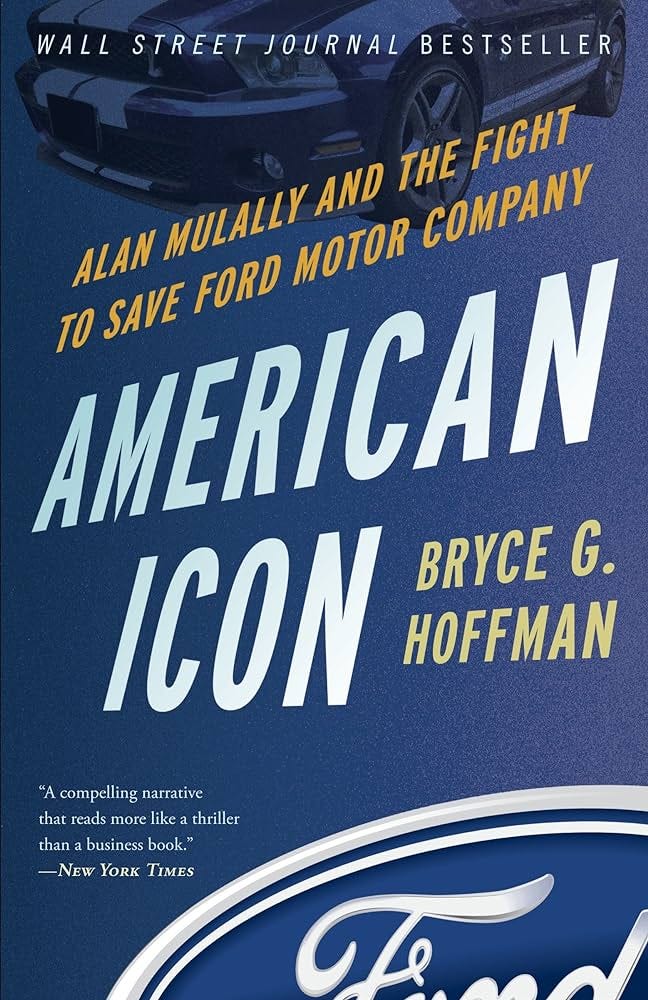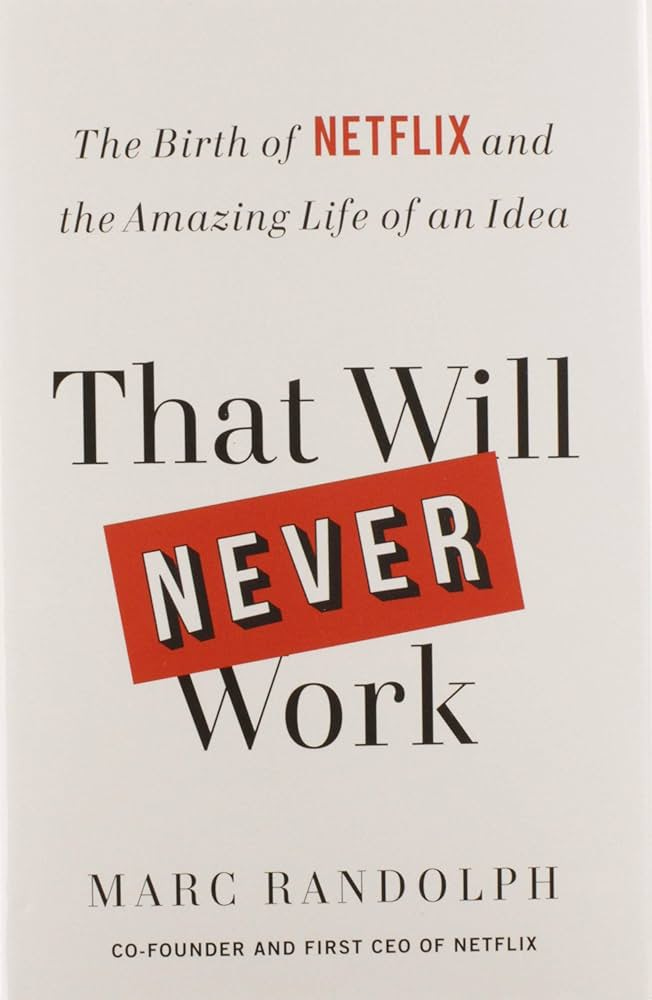Book Club 2 - American Icon
The following was originally published for Patrons on October 20th, 2023. Get caught up at your own pace by joining at the "Post Parisian" level or above!
Books First
I don't want to leave out two inspiring books that I read this summer. One of them was well-sourced and written by a journalist very close to the action. The other was pure propaganda. Both were fun, if for different reasons.
American Icon
As a 90's kid, Ford isn't exactly a name that speaks quality to me. In high school we jokingly predicted that our friend's Ford Taurus would drop its transmission at 100k miles and, to our adolescent glee, it did. I also drove a Chevy Malibu, muscle car competition to the Mustang, so I was biased from the start.
But American Icon managed to break through my skepticism with the story of the man who saved Ford. The the history of Ford Motor Company is one littered in highs and lows, machismo, union busting, and a culture that could be likened more to organized crime than that of an American corporation. Henry Ford's vision to put a car in every garage did not include a roadmap for long-term profitability in the face of economic decline. Nor did his famed efficiency in manufacturing spill over into corporate efficiency. They thrived in the booms, scrambled in the busts, and somehow survived every time.
The culture in Ford was that of a fiefdom, starting in Ford's day, and as the company passed through successive hands that seemed impossible to change. At least until Alan Mulally took the top spot and transformed the company.
If you're anything like me, the premise sounds a bit dry. I always love a bit of intrigue and some business know-how, but a book about restructuring a car company? Managing macho Michiganian manufacturing men? Not exactly my cup of tea (I haven't owned a car since 2010 and I only recently started wanting one again - and purely so I can explore the hard-to-reach parts of the French countryside). But this book was amazing.
The main reason I found it really inspiring was the way that Mulally, an outsider to Ford, was able to break up the toxic, century-old culture. Not only that, but how he did it: not with mass layoffs, management changes, or harsh HR policies, but with radical honesty (Although the layoffs would have to happen to keep Ford from going under). It was a monumental task, but his method was to piece together the harsh realities facing Ford, require his leadership team to face those realities, and create a plan forward to simplify and streamline the company, and stick to it.
That sounds simple, but the men (and they were 90%+ men) in that leadership team were more likely to stab each other in the back than they were to admit struggles in their own departments (and thus give more ammo to their rivals). Mulally kept no secrets, and while he didn't force anyone out, he knew his policies requiring honesty and transparency would naturally drive away anyone who wouldn't eventually align.
And he was right. What I found most inspiring was that after just a couple of resignations, the rest of the team eventually came around. They would be held accountable but, once they trusted the process, their honesty would bring the help they needed to keep afloat. Eventually it would align everyone to the same, simple mission that Mulally proposed. And all of this in the face of the economic crisis in 2008. When the other major US auto manufacturers took bailouts from the US government, Ford would navigate it on their own. Then they'd leapfrog the competition.
I won't say that I hide anything from my team, but Mulally's example was one that's led me to be even more transparent. The guidelines of getting everyone on board by setting clear goals, and showing even clearer metrics from all corners in order to understand how we're doing, where to celebrate, and where to put more effort have been invaluable. I have a long way to go in my own leadership skills, I'm not going to get tapped to run a major multi-national anytime soon, but it was one of the first times I found inspiration in someone doing exactly that.
Well, Not Exactly
That Will Never Work is also a book about a company, Netflix, and the one I read just before American Icon. It's a lot of fun to read the story of the inception, founding, and rapid rise of the streaming service that disrupted the film industry. It's written to be fun. But it also feels very much like an ousted CEO trying to get his two cents into the myth of his company before his version is completely forgotten.
That doesn't mean it isn't worth a read. Particularly if you've ever dreamed of starting your own company and overcoming a host of novel challenges along the way. While I won't say that this book had a direct impact on how I do what I do, it certainly gave me a little boost to keep going. We can all use a little inspovation from time to time (inspiration + motivation), and I found it here. That said, despite the attempt at a 'riding into the sunset' vibe at the end of the book, I found it a little sad.
Not just because Marc Randolph, the author, found himself on the outside of the company he dreamed up and founded. It felt very much like he didn't really know what to do with himself after the fact. I think that's normal, to pour your life into something and come out the other side uncertain of what's next, but it seemed like he lacked any direction at all beyond the singular drive to build "the thing." Once he lost that thing, did he lose himself? I can't answer that, but it was a reminder that I needed to find a greater direction for myself that could endure any loss along the way.
The YouTube I Loved
There are a lot of videos I've loved this week, but I've tumbled back down the rabbit hole of video essays from some of my favorite video essayists. I realized after posting last week that I didn't even mention Dan Olsen's latest, and then I wound up watching all kinds of Tom Nicholas videos... and here we are. The theme for this week is "Videos That Will Educate And Age You One Hour At a Time."
Dan Olsen, aka Folding Ideas, has been a favorite of mine for years now. Thankfully he ditched his puppet a few years ago and started appearing on screen as himself, and it's only done his storytelling favors. I actually have this clip saved in a little private meme playlist for emergency use. I might highlight some other favorites as we go, like the Line Goes Up, a masterpiece in dissecting the problems with NFT culture, but his latest rehash of the GameStop debacle was well worth the watch. Even if you're familiar with the GameStonk madness, as usual, he takes a deeper dive than most anyone is willing to and comes up with a story that is very worth the telling.
Tom Nicholas did a deep dive into the grift economy that was both very well put together, but also took a surprising turn. One of the things that I love most about essayists like Tom is the combination of balance in approach and willingness to look straight at the bigger and more present problem. When he turns his attention to the larger players in the field, he starts to scratch at something that can be really hard for most of us to face. At least I know it can be hard for me to stop and look at something our society deems as acceptable or mainstream, and call it out for what it is.
More essayists I love, but haven't posted in a minute, include (but aren't limited to) HBomberGuy, Contrapoints, Nerdwriter1, and NakeyJakey. I'm sure they'll make appearances here in the future.
For Those Not Into Video Essays
Sticks is a new channel that keeps popping up in my feed. I finally clicked through on their video about making a movie trailer for Mark Rober (and surprising him with it) and I'm so glad I did. These guys are masterful and a little nuts. They've set out to make movie trailers for YouTubers until they reach their final goal of making a full feature for Mr. Beast. Their storytelling chops are inspiring, and their bravery in diving into the challenge they've set for themselves is admirable (if intimidating). You may be surprised how moving such a simple premise can be. I wound up watching a few more (Ryan Trahan's is a great starting point, even before Mark).
Podcasts of the Week
The Tropical MBA interviewed Lucy Bella Simkins, a YouTuber I didn't actually know before but who built an English-learning channel from 2016 that has grown into a massive operation. If you're interested in language learning or building a business on YouTube (or socials in general) she had a lot of interesting tidbits. It also served as a great reminder to me why I'm glad I don't teach English anymore haha. Jeff suggested this one to the team this week.
I have a lot of episodes of Startups for the Rest of Us to catch up on after traveling for so long, which is really nice. Their episode on planning and building events was really interesting. As we talk more about how to get back to real-world events here in Paris, and helping people meet up face to face, there were some really valuable lessons in here that might help us avoid certain pitfalls. The biggest takeaway: get sponsors for your event! They're too expensive otherwise.
And I think that's it for this week. I have plenty more to share from coaching, but I'll get into that next week. Unfortunately Cooper had a reaction to his vaccines last night and he's still in a bit of rough shape, so we need to get to the vet now that they've opened.
Have a great weekend, and happy reading!





